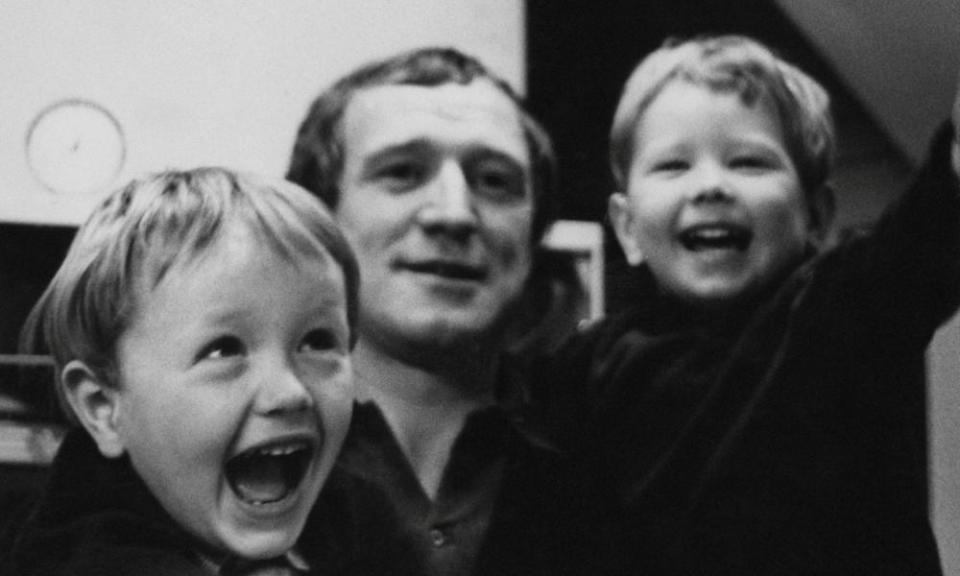The Ghost of Richard Harris review – a hushed reassessment of a hellraiser by his sons
Adrian Sibley’s documentary is a genial, if sometimes incurious film about the legendary Irish actor and singer, who began his screen career as a pressure-cooker of rage on the rugby field in Lindsay Anderson’s This Sporting Life and finally became the beatific face of snowy-haired wisdom as Dumbledore in the first two Harry Potter movies.
This watchable film goes easy on Harris’s boozing and brawling: in fact, it takes an almost a counter-revolutionary approach to the whole subject. In recent years, talk of Ollie and Peter and Richard’s hell-raising has usually been countered with a frowning diagnosis of alcoholism, and this film simply quotes Harris’s own roistering dismissal of all that: (“I drank because I loved it!”) and pretty much leaves things there. Incredibly, Harris hired a press photographer to cover a week-long post-divorce European jaunt via private plane he took with his entourage, which took in many bars and brothels – to humiliate his ex-wife, it is alleged, although his high-jinks were covered with giggling hilarity in the papers. Harris’s cocaine habit is hardly mentioned: I suspect because it doesn’t fit in with the essentially sentimental narrative of booze.
We go from Harris’s boyhood in a well-off home in Limerick in the Irish republic, his idyllic summers on Kilkee in County Clare, with a large family whose stern, disciplinarian dad was a powerful presence, and then to the Jesuit school where getting the strap was normal. He came to acting late, became a mature student at Lamda in London and, with remarkable entrepreneurial flair, rented a small theatre to mount his own production of Clifford Odets’ Winter Journey (The Country Girl); it led to a job with Joan Littlewood’s Theatre Workshop, West End stage roles and then a stellar movie career, with work in musical theatre, the long-running, long-touring Camelot stage show, and an amazing side-hustle in pop music.
The most affecting parts of the film come with his three grownup sons gathering to remember him: actor Jared Harris, director Damian Harris, and actor Jamie Harris. They are still overawed by the colossal reputation which he had cultivated while far away from their growing-up (the boys had been placed at boarding schools). There is something very ghostly in Jared coming back to the sumptuous suite Harris kept at London’s Savoy hotel, where he spent his final days.

So where did the rage come from, Jared wonders, the rage that lay behind so much of the excess? Sibley offers a very plausible explanation: when Harris was 19, his promising sporting career was ruined by a diagnosis of tuberculosis, which kept him in bed and which was also socially humiliating because TB was associated with the lower orders. It was in his sickbed that Harris discovered Shakespeare and the imaginative life – but maybe that surge of imagination fused with a surge of frustration and rage.
And how about his emotional life and family life? What was it really like, day after day, week after week, month after month for his wife Elizabeth Rees-Williams who was stuck at home and the boys sadly away at boarding school, while Harris was away on location and on tour, enjoying himself? Sexual indiscretions were an important but undiscussed part of booze episodes, and post-booze amnesia was a convenient route to self-forgiveness. The film gallantly steers away from this. Leniency is the film’s mode of operation, but it wouldn’t work without it, and it’s a watchable study of a unique talent.
• The Ghost of Richard Harris screened at the Venice film festival.

 Yahoo Movies
Yahoo Movies 
